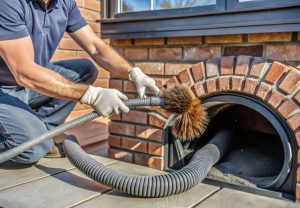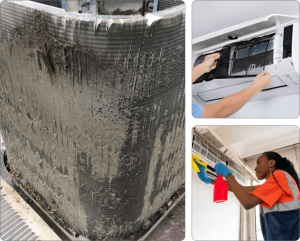Being a NJ resident, you already know how much your HVAC system works all year round. Summers are quite humid and hot, while winters bring cold snaps that make you reach for that thermostat more often than you’d like. Your HVAC system doesn’t just heat or cool your home. It keeps the air fresh, the humidity balanced, and your energy bills in check.
But here’s the thing: even the best HVAC unit can’t run efficiently if it’s full of dirt, dust, and debris. Regular HVAC cleaning is what keeps it breathing freely. It’s like brushing your teeth; if you skip it, things start to get messy fast.
This seasonal HVAC unit cleaning checklist is built specifically for New Jersey homeowners. It’s simple, practical, and broken down by season so you can stay on top of maintenance without calling a technician every time. Let’s walk through it together.
Spring Cleaning Checklist
When spring rolls in, it’s time to wake your HVAC unit from its long winter nap. Dust, pollen, and leftover debris from the colder months can clog filters and vents. Here’s how to give your system a fresh start.
Change or Clean the Air Filters
This is the easiest yet most important step.
- Why: Dirty filters make your system work harder, waste energy, and blow dusty air around your home.
- What to do: If your HVAC uses disposable filters, swap them out every 1-3 months. If you use washable ones, rinse them thoroughly and let them dry before putting them back in.
Clean the Vents and Registers
Take a quick tour around your house. Remove vent covers and give them a wipe with warm, soapy water.
- Use a vacuum with a brush attachment to clean the visible parts of the duct.
- Avoid pushing dust deeper inside; you’re just moving the problem.
Check the Outdoor Condenser Unit
In New Jersey, the outdoor unit often sits under trees or near fences. During winter, debris like leaves or branches might have piled up.
Turn off the power first.
- Remove any debris or vegetation around the unit. Keep at least two feet of clear space around it.
- Gently hose off the coils to remove dust buildup. Avoid high-pressure settings to prevent bending the fins.
Inspect the Thermostat
As the weather warms up, switch your thermostat from heat to cool. Make sure it responds right away.
- If you still have a manual thermostat, consider upgrading to a programmable or smart model. It saves energy and money.
- Set a schedule that keeps your home cool while you’re home but eases off when you’re away.
Test the System
Run your air conditioner for at least 15 to 20 minutes. Listen for strange sounds.
- Is it cooling evenly?
- Any weird smells?
- Is the airflow strong enough?
If anything feels off, it’s better to call a technician now rather than wait until the first heatwave hits.
Summer Maintenance Checklist
Summer in New Jersey can feel sticky. A clean and well-maintained HVAC system can make the difference between comfort and frustration. Here’s what to check once summer kicks in.
Replace Filters Again
Yes, again. Summertime means more use, more dust, and often more pollen.
- Make it a monthly habit during peak months.
Check Refrigerant Lines
These are the copper pipes running between your indoor and outdoor units.
- Look for cracks, leaks, or frost buildup.
- If you notice ice forming or your air feels warm, it may mean a refrigerant leak. Don’t try to fix it yourself; call a professional.
Clean the Condensate Drain Line
This little line helps remove moisture that your AC pulls from the air.
- Mix a cup of vinegar with warm water and pour it down the drain to prevent mold and algae buildup.
- If the drain clogs, water can back up into your home and cause musty smells.
Inspect the Ductwork for Leaks
Leaky ducts waste cool air and increase your bills.
- Hold your hand near joints or connections to feel for escaping air.
- Seal small leaks with aluminum duct tape or mastic sealant.
Shade the Outdoor Unit
If possible, create some shade for your condenser, but make sure air can still circulate. A shaded unit can run up to 10% more efficiently.
Monitor Energy Bills
Keep an eye on your monthly electric bills. A sudden spike usually means your system is straining, often because of dirt, leaks, or low refrigerant. Catching it early saves big money.
Also read: What’s the Most Effective Air Duct Cleaning Method in 2025?
Fall Preparation: Get Ready for Heating Season
When temperatures start to drop, your HVAC system switches gears. It’s time to get it ready for the heating season.
Swap Out Filters
Filters should be changed or cleaned before the first cold night. This ensures your furnace or heat pump can push warm air freely.
Check the Blower Belt and Motor
If your system uses a belt-driven blower, inspect it for cracks or fraying. Tighten loose belts and lubricate the motor bearings if needed.
- A squeaky sound often means a worn-out belt. Replace it before it snaps.
Inspect the Burner and Ignition
For gas furnaces:
- Look at the flame. It should burn blue, not orange or yellow. A yellow flame means dirt or poor combustion.
- Dust off the burners gently.
- If your pilot light keeps going out, call a technician; it could be a safety issue.
Clean Around the Furnace
Clear away anything flammable within three feet of the furnace. Boxes, paint cans, or cleaning supplies can create hazards.
Test the Carbon Monoxide Detector
Before the heating season, always test your CO detector. Replace the batteries and make sure it’s working properly.
- Carbon monoxide is odorless but deadly. Don’t take chances.
Check Windows and Insulation
If your windows are drafty, even the best HVAC system can’t keep you cozy.
- Seal leaks with weatherstripping or caulk.
- Add insulation to your attic or basement if you haven’t already.
Schedule a Professional Tune-Up
Fall is the perfect time for a pro inspection.
- A licensed HVAC technician can clean internal components, check refrigerant levels, and make small adjustments that keep your system efficient all winter.
Also read: Is There a Leak in Your Ductwork? How to Detect and Fix It.
Winter Upkeep Checklist
When New Jersey’s winter hits hard, your HVAC system works nonstop. To keep it running smoothly and safely, follow this simple checklist.
Keep Vents Unblocked
Don’t place furniture, rugs, or boxes in front of vents. Your system needs open airflow to heat evenly.
Check the Thermostat Batteries
If your thermostat suddenly goes blank, it might just need new batteries. Replace them once a year as a habit; preferably before winter.
Watch for Unusual Noises
Grinding, banging, or rattling sounds can mean something’s wrong inside the blower or motor. Turn the system off and get it checked.
Change the Filter Monthly
In winter, filters trap not just dust but also pet hair, lint, and indoor smoke. Keeping them clean makes your air healthier and prevents overworking the blower motor.
Clear Snow Around the Outdoor Unit
If you use a heat pump, make sure snow or ice doesn’t block airflow.
- Gently brush off snow after every storm.
- Don’t use sharp tools; you might damage the fins.
Keep an Eye on Humidity
Dry winter air can make your home uncomfortable.
- Use a humidifier to keep indoor humidity between 30–50%.
- Some HVAC systems have built-in humidifiers, and they clean and refill them regularly.
Test Safety Shutoff Systems
If you have a gas furnace, test the safety switches and pilot lights. They help prevent overheating or gas leaks.
Watch the Flame Color Again
Remember: blue flame is good. Orange or yellow means dirty burners or improper gas flow.
Open Vents Even in Unused Rooms
Closing vents may seem smart, but it can throw off the pressure balance in your system, causing damage over time. Keep all vents at least partly open.
Year-Round Maintenance Habits
Besides seasonal tasks, a few simple habits can keep your HVAC system happy all year long.
Keep the Area Around the Unit Clean
Vacuum the area around your indoor unit every few weeks. Wipe down the exterior and make sure no dust builds up.
Replace Filters Regularly
Yes, it keeps coming up, but it’s not that important. Clean filters save energy, protect the blower motor, and improve air quality.
Monitor Your Thermostat Settings
Don’t crank your thermostat up or down drastically. Gradual changes help your system run more efficiently and last longer.
Check for Air Leaks in Your Home
Use an incense stick near doors and windows. If the smoke wavers, there’s a draft. Seal those leaks before they drain your wallet.
Keep an HVAC Logbook
Write down when you clean, replace, or service different parts. It helps track performance and prevents forgetting key tasks.
Schedule Professional Inspections Twice a Year
Even with regular DIY cleaning, professional checkups are essential. Spring and fall are perfect times to get a technician’s eyes on your system. They can spot issues you can’t see, like refrigerant pressure, worn belts, or small leaks.
Signs Your HVAC Needs Immediate Attention
Sometimes, cleaning and checklists aren’t enough. Here’s when you should call an HVAC technician right away:
- Strange Smells: Burning or musty odors signal electrical or mold problems.
- Weak Airflow: Could mean a blocked duct, failing motor, or dirty coil.
- Uneven Temperatures: Might be thermostat issues or duct leaks.
- Water Around the Unit: Usually from a clogged drain line or condensation leak.
- Frequent Cycling: The system turns on and off too often—often caused by dirty components or bad sensors.
- Unusual Energy Bills: If your usage is steady but the bill shoots up, your HVAC is overworking.
Don’t wait until it breaks down in January or July; it always costs more to fix emergencies.
Save Energy with Smart Cleaning Habits
Regular cleaning isn’t just about comfort; it’s also about saving money. A dirty HVAC system can waste up to 20% more energy than a clean one.
Here’s how to make your cleaning efforts count:
- Keep your vents open and unblocked.
- Use a programmable thermostat. Set it to match your daily routine.
- Seal duct leaks. Even small gaps can waste huge amounts of energy.
- Add ceiling fans. They help move air and take pressure off your HVAC.
- Close curtains during the day in summer and open them during winter days to take advantage of natural heat or coolness.
Need Help With Seasonal Unit Cleaning? Contact Alpha Clean Air
Your HVAC system is one of the hardest-working parts of your New Jersey home. It keeps you warm in December, cool in July, and comfortable every day in between. But it needs regular care to stay efficient, safe, and reliable.
Get your HVAC unit cleaned regularly with Alpha Clean Air. Our licensed and insured HVAC contractors will inspect your unit and clean it accordingly. Contact us today and book an appointment.





